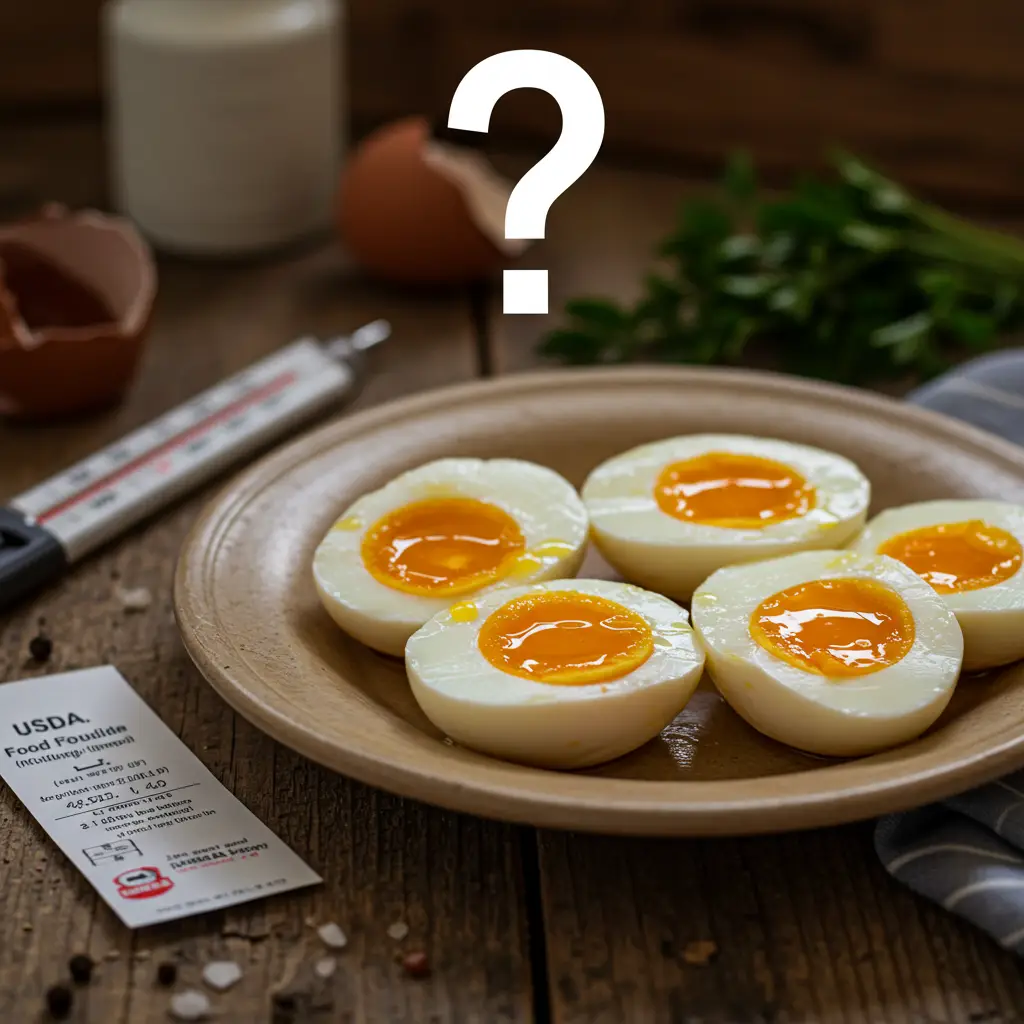Are jammy eggs safe to eat? That question came up last Easter Sunday at my aunt’s house in Georgia. I’d brought a platter of jammy eggs to share—halved neatly, their golden centers still soft and glossy. My uncle, always cautious, leaned over and asked, “Those look a little underdone. Are jammy eggs safe to eat?” I smiled, but I realized not everyone feels confident about these creamy-centered beauties.
In Southern kitchens, we love flavor—but we also respect food safety. And when it comes to eggs that aren’t fully firm, it’s only natural to ask, are jammy eggs safe to eat or are we taking a risk? What about salmonella? Can we serve them to kids or grandparents? Are jammy eggs safe to eat if the yolk is still soft, or does that cross into risky territory?
We’ve come a long way from judging eggs just by sight and smell. Today, understanding internal temperatures, cooking times, and storage methods is key. That’s especially true when you’re working with eggs that aren’t hard-boiled all the way. In this guide, we’ll explore exactly why jammy eggs are safe to eat—and under what conditions they aren’t. We’ll look at health guidelines, expert advice, and techniques you can use in your own kitchen.
If you’ve already visited Jammy Eggs 101: What Are Jammy Eggs and Why Everyone Loves Them, you know why these eggs are loved by foodies, chefs, and brunch-lovers everywhere. But let’s go deeper into the safety side, and answer this once and for all: Are jammy eggs safe to eat? With the right method, yes—they absolutely are.
Table of Contents
Understanding the Safety Basics of Jammy Eggs
Why People Ask: Are Jammy Eggs Safe to Eat?
The first time I served jammy eggs to guests, someone paused, fork in hand, and asked, “Are jammy eggs safe to eat?” The yolks were soft, golden, and slightly shiny. That perfect custard-like center that we all love? To some, it still looks risky. So let’s clear the air: Are jammy eggs safe to eat, or should we be cautious?
Jammy eggs are gently cooked eggs with fully set whites and soft yolks. They’re not raw, and they’re not just underdone. The key lies in cooking them at the right temperature—and that’s where most of the confusion begins.
Temperature: The True Measure of Safety
According to the USDA, eggs are considered safe when they reach 160°F (71°C) internally. That’s enough to kill harmful bacteria like salmonella. Luckily, you don’t need to dry out your yolks to hit that number. In fact, methods like pressure steaming and sous vide allow you to control temperature perfectly. You can get that creamy yolk and still stay in the safe zone.
We explain how this works in Instant Pot Jammy Eggs and our precision-based method in Sous Vide Jammy Eggs. In both cases, you can cook jammy eggs safely and confidently—without sacrificing flavor or texture.
So, are jammy eggs safe to eat when cooked like this? Absolutely. Use fresh, pasteurized eggs, cook them right, chill them fast, and store them properly. That soft yolk doesn’t mean danger. It means you nailed the method.
Still asking yourself, are jammy eggs safe to eat? Yes. And the next time you serve them, you’ll answer with certainty—and zero hesitation.
What About Salmonella? Science & Common Myths
Debunking the Fear: Are Jammy Eggs Safe to Eat?
It’s the most common question that comes up when golden yolks hit the plate—are jammy eggs safe to eat? That soft, jammy center might look undercooked to the untrained eye. And since salmonella is often tied to eggs, people hesitate. But the truth is simple: jammy eggs are safe to eat if you cook them with care.
Salmonella can live on the shell or inside the egg. That’s why cooking to a safe internal temperature is key. According to the USDA, eggs become safe at 160°F (71°C). Luckily, jammy eggs can reach that temperature without turning into dry, hard-boiled rounds. So yes, are jammy eggs safe to eat when cooked right? Absolutely.
Boiling for the right time or using controlled methods like Instant Pot Jammy Eggs or Sous Vide Jammy Eggs ensures that the center stays creamy while bacteria are eliminated.
Pasteurized Eggs Add Peace of Mind
For even more confidence, start with pasteurized eggs. These eggs are lightly heat-treated to kill bacteria without cooking them. So even if your timing is slightly off, you’ve already reduced the risk. It answers the question again: are jammy eggs safe to eat? Yes—especially with pasteurized eggs.
When someone asks you, “Are jammy eggs safe to eat if the yolk jiggles?” the answer is yes, as long as the cooking process was safe and deliberate. Restaurants serve soft eggs every day with confidence, using time and temperature as their guide.
The next time you’re serving brunch, and someone glances nervously at a soft yolk, you can smile and say, “Yes—jammy eggs are safe to eat when you know what you’re doing.”
Still asking, are jammy eggs safe to eat if they’re made at home? Of course they are—if you follow methods we’ve already tested. And that’s what we cover here: not just food, but confidence.
Are Jammy Eggs Safe to Eat During Bird Flu Season?
When the Headlines Worry You—Here’s What to Know
Every time the news mentions a bird flu outbreak, the same concern comes up around the breakfast table—are jammy eggs safe to eat right now? It’s a fair question. Their yolks look soft, not fully set, and that raises food safety worries. But softness doesn’t mean risk when you cook eggs properly.
Bird flu (avian influenza) is transmitted mainly through direct contact with infected birds—not through eggs that have been handled and cooked safely. According to the CDC and USDA, cooking any egg to 160°F (71°C) eliminates harmful viruses like bird flu. That includes jammy eggs. So yes, jammy eggs are safe to eat during bird flu outbreaks—as long as you follow safe practices.
We explain this in detail in How to Make Jammy Eggs, and our Air Fryer Jammy Eggs method lets you cook with precision. In both cases, the creamy yolk is achieved without compromising safety.
Practical Tips to Keep Jammy Eggs Safe
Still wondering: Are jammy eggs safe to eat when you buy them from local markets or small farms? The key lies in freshness, cleanliness, and correct storage. Eggs should be refrigerated below 40°F (4°C), used before their expiration date, and washed (if unwashed at source). When you combine those steps with proper cooking, jammy eggs are safe to eat, period.
Want extra protection? Go with pasteurized eggs. These eggs are gently heat-treated to kill salmonella and viruses without changing their raw state. That means even if your timing is slightly off, you’ve still reduced any safety risk.
If you’ve ever asked, are jammy eggs safe to eat when prepared at home versus restaurants—the answer is yes to both, as long as temperature and timing are respected. In fact, many chefs serve jammy eggs daily, because they trust the technique and science behind them.
We get it—soft yolks can look undercooked. But cooked to the right temperature, they’re not only safe—they’re delicious. And if someone still nervously asks at brunch, “Are jammy eggs safe to eat right now with everything going on?” you can reassure them with facts. Not feelings.
With care and consistency, there’s no reason to avoid your favorite Southern comfort. Let science guide your spoon, and rest assured—jammy eggs are safe to eat, nourishing, and always worth the effort.

Serving Jammy Eggs Safely in Real Life
Beyond the Plate: Everyday Safety in Southern Kitchens
We love a good jammy egg sliced over toast or tucked into a sandwich—but let’s talk about something rarely discussed: are jammy eggs safe to eat when served with other perishable ingredients? Whether you’re planning a picnic, packing a lunch box, or hosting brunch outdoors, safety becomes more than just a kitchen concern—it becomes about time, temperature, and smart pairing.
Jammy eggs are best enjoyed within two hours if served at room temperature. But what happens when they’re placed on avocado toast with fresh cheese, or layered into a salad with mayo-based dressing? That’s where cross-contamination and timing can compromise safety. So, are jammy eggs safe to eat in those conditions? Yes, if you take the right precautions.
Always assemble your meal just before serving. If you’re taking jammy eggs outdoors or to work, use an insulated lunch container with an ice pack. Avoid combining them with raw sprouts or unwashed greens—two of the biggest culprits in foodborne illness outbreaks.
Smart Pairings for Safety and Flavor
Many people ask: are jammy eggs safe to eat in sandwiches or wraps? Absolutely—but skip ingredients that spoil fast like tuna salad, unrefrigerated deli meats, or egg salad made hours before. Instead, pair jammy eggs with roasted vegetables, cooked grains, or cured meats that don’t demand cold storage immediately.
Hosting brunch? Create a DIY toast bar where eggs are kept chilled until serving. Let guests add their toppings—then serve immediately. This Southern-style hospitality ensures everyone eats fresh and safe.
If you’re creating bento boxes or lunch bowls for later, add jammy eggs whole, uncut, and cold. Slice just before eating. It’s the little steps like these that take the question “Are jammy eggs safe to eat?” from worry to confidence.
Safety isn’t about fear—it’s about smart habits. And when you understand how ingredients behave outside the fridge, jammy eggs are safe to eat in more ways than you think.
Myth-Busting Jammy Egg Fears in the Kitchen
Separating Southern Wisdom from Modern Misconceptions
In many Southern homes, food safety is passed down like recipes—often more tradition than science. That’s why questions like “Are jammy eggs safe to eat?” are so common, especially among older generations. Grandma might raise an eyebrow at a soft yolk, but modern kitchen science says otherwise.
Let’s debunk the myths. First: jammy eggs aren’t raw. The yolk might look shiny or soft, but when cooked at the right temperature and time, it’s completely safe. The difference is texture—not doneness. If someone still wonders, “Are jammy eggs safe to eat if they jiggle?” the answer is yes. Jiggle doesn’t mean danger—it means you nailed the technique.
Second: not all soft eggs are undercooked. Some people confuse jammy eggs with runny scrambled or sunny-side-up styles. Jammy eggs are controlled and precise. That’s what makes them safe—and repeatable.
You don’t have to take our word for it. Our guides, like What Is a Jammy Egg?, explain the structure, texture, and safety of these golden beauties. If you follow time, temperature, and handling tips, there’s no question left about whether jammy eggs are safe to eat—they are.
Understanding the Real Risks
Now let’s talk about the actual risk: contamination. The danger isn’t the soft yolk—it’s how the egg is handled before cooking. Eggs stored improperly, cracked during transport, or exposed to dirty surfaces are the real concern.
So again—are jammy eggs safe to eat in daily meals? They are, especially when you start with high-quality eggs, cook them at proper temperatures, and chill or serve them immediately. That’s how home cooks and chefs alike keep kitchens safe without sacrificing flavor.
Even in a casual kitchen, safety doesn’t mean sacrifice. It just means knowledge. Knowing that jammy eggs are safe to eat when handled and cooked right helps you enjoy what really matters: texture, taste, and tradition—without fear.
From Farm to Fork — Tracing Jammy Egg Safety Step-by-Step

Where Your Eggs Come From Matters
When people wonder, “Are jammy eggs safe to eat?”, they’re often thinking about the cooking. But true safety starts way earlier—on the farm, in the storage, and even at the grocery store. Understanding that journey helps you stay confident when prepping those soft, golden yolks at home.
Start with sourcing. Choose eggs labeled “pasteurized” if possible, especially if you’re planning to cook them soft. These eggs have been heat-treated in their shells to eliminate bacteria like salmonella. For regular store-bought eggs, check that the shells are clean, uncracked, and refrigerated. That’s your first line of defense.
At home, proper storage is everything. Keep eggs cold (below 40°F/4°C), and use them within 3–5 weeks. Always wash your hands and clean surfaces after touching raw eggs—even if you plan to fully cook them. These small habits build a solid food safety foundation and make sure jammy eggs are safe to eat, every time.
The Chain of Confidence: Cook, Cool, Consume
Cooking jammy eggs is just the middle link in a three-step chain: cook → cool → consume. Each step matters.
Once your eggs reach 160°F, the pathogens are neutralized—but if you don’t chill them quickly, bacteria can grow back. That’s why we emphasize the ice bath in our How to Make Jammy Eggs guide. It’s not just for easy peeling—it’s food safety 101.
The final step? Serving. Use them within 5 days if stored properly. Keep them whole until serving. And if you’re building a brunch board or picnic tray, don’t leave them out longer than two hours. Want inspiration on how to use them safely and creatively? See our Jammy Eggs for Ramen recipe—it’s a flavorful, structured way to enjoy soft eggs without stress.
So next time someone at your table asks, “Are jammy eggs safe to eat?”, you won’t have to guess. From farm to fork, you’ve followed the science—and that’s what turns a Southern comfort dish into a confident classic.
conclusion
What If That Golden Yolk Isn’t Just Delicious—But Dangerous?
It’s soft. It’s glowing. It oozes just slightly when sliced open on your plate. A jammy egg looks innocent, even elegant—until that one question creeps into your mind:
“Is this really safe to eat?”
You’ve followed the recipe. You chilled the eggs. You trust your kitchen. But somewhere in the back of your mind, there's still that shadow of doubt. You remember stories—salmonella, food recalls, warnings whispered from grandmother to mother to child. The fear doesn’t come from science. It comes from not knowing.
So the next time someone asks, “Are jammy eggs safe to eat?”, don’t dismiss the question. Face it. Because food should be both delicious and safe. And trust—true, lasting trust—comes not from guessing, but from understanding.
That’s what separates an undercooked gamble from a precision-cooked jammy egg: knowledge.
Because nothing should steal the joy of a creamy yolk—especially not fear.

Frequently Asked Questions (FAQs)
1. Are jammy eggs safe to eat if they still look soft?
Yes, they are! While jammy eggs may appear soft in the center, they are safe to eat when cooked properly. As long as they reach an internal temperature of 160°F and are immediately cooled, the texture doesn’t signal undercooking—it’s a sign of precision. Many folks hesitate and ask, are jammy eggs safe to eat when the yolks look shiny? Yes, they are soft, not raw.
2. Can I eat jammy eggs straight from the fridge?
Definitely. Once fully cooked and chilled in an ice bath, jammy eggs can be stored safely in the fridge for up to five days. They're delicious cold, especially in lunch bowls or salads. If you’ve been wondering, are jammy eggs safe to eat cold, rest easy—they’re a safe and satisfying grab-and-go protein.
3. Are jammy eggs safe to eat when meal-prepped in advance?
Absolutely. In fact, jammy eggs are ideal for weekly prep. Keep the shells on until just before eating, and store them in a sealed container in the fridge. Whether you’re packing lunch for work or prepping breakfasts, you don’t need to question are jammy eggs safe to eat later—as long as they stay cold, they’re good to go.
4. Do jammy eggs carry a risk of salmonella?
Only when made with poor-quality eggs or undercooked below safe temps. Use clean, refrigerated, and pasteurized eggs, and always follow the correct cooking method. It’s normal to ask are jammy eggs safe to eat in terms of foodborne illness, but if you follow safe prep guidelines, the risk is very low.
5. Are jammy eggs safe to eat during pregnancy?
With caution, yes. If you’re using pasteurized eggs and cooking them to the right temperature, jammy eggs can be part of a balanced pregnancy diet. However, always consult your doctor. Many soon-to-be moms ask are jammy eggs safe to eat while pregnant, and the answer depends on both temperature and individual health.
6. Is it okay to combine jammy eggs with other chilled items like mayo or meats?
Yes, but with care. If you’re building an egg salad or sandwich that includes jammy eggs, make sure all ingredients stay cold and are eaten within a safe time window (within 2 hours if unrefrigerated). So yes, are jammy eggs safe to eat with spreads or deli meats? They are—when served fresh and kept cool.
7. Are jammy eggs safe to eat during a bird flu scare?
They are, as long as they’re cooked and handled properly. Bird flu isn’t transmitted through fully cooked eggs. Still, it’s smart to source from clean, reputable farms. The CDC confirms that even during outbreaks, jammy eggs are safe to eat if cooked to the correct temperature.
Craving something new? We share exclusive recipes regularly on Facebook—check them out!






